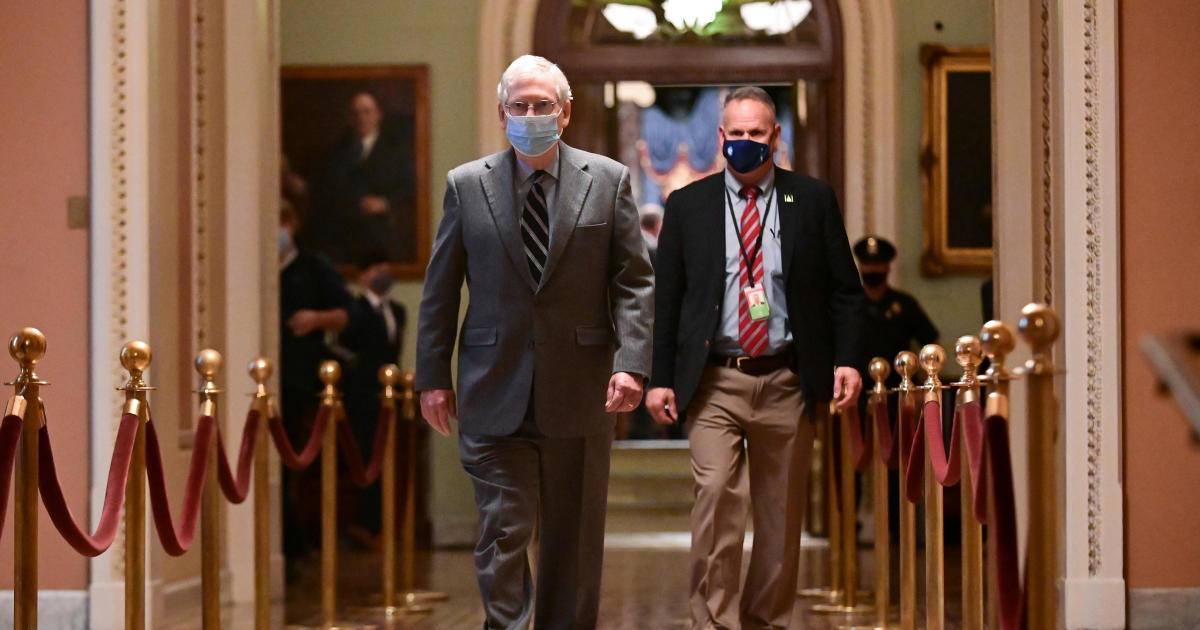
Washington — Senate Majority Leader Mitch McConnell said on Thursday that the Senate is “highly likely” to work through the weekend as congressional leaders scramble to reach a deal on a government funding measure and a coronavirus relief bill.
The Republican leader suggested Congress may have to pass a short-term continuing resolution to keep the government open past a Friday deadline to avert a shutdown and give lawmakers more time to negotiate.
“We are going to stay right here, right here, until we are finished, even if that means working through the weekend, which is highly likely,” McConnell said in a speech on the Senate floor on Thursday. McConnell added that if a continuing resolution was necessary, he hoped it would extend the deadline to fund the government by a “short window of time.”
Congress passed a continuing resolution last week to extend the deadline for government funding to December 18, but an additional week for negotiations does not appear to have been enough time for lawmakers to craft an omnibus spending bill that is mutually agreeable to the Democrats controlling the House and the Republican majority in the Senate. Lawmakers also wish to append a coronavirus relief bill to this omnibus measure, and congressional leaders are still negotiating that deal.
The need to pass a relief bill is just as urgent as an overarching government spending bill. Around 12 million Americans are set to lose their unemployment benefits the day after Christmas, with the expiration of the Pandemic Unemployment Assistance and the Pandemic Emergency Unemployment Compensation programs, which were established in the spring by the CARES Act. Nearly 500,000 people applied for the Pandemic Emergency Unemployment Compensation program, intended to aid gig workers, in the week ending December 12.
The Lost Wages Assistance program, created by Mr. Trump via executive order in August, is also largely tapped out. Mr. Trump signed the order directing states to pay $300 in supplemental weekly benefits on top of unemployment insurance in August, after a popular provision in the CARES Act providing an additional $600 per week in unemployment benefits expired at the end of July. Meanwhile, some 885,000 people filed initial unemployment claims in the week ended December 12, the Labor Department said Thursday — an increase of 23,000 from the prior week.
A bipartisan, bicameral group of lawmakers last week introduced two bills amounting to $908 billion which would address some of these issues, such as a provision to reinstate the weekly unemployment benefits at $300 per week for four months.
McConnell, Speaker Nancy Pelosi, Senate Minority Leader Chuck Schumer and House Minority Leader Kevin McCarthy have engaged in negotiations in recent days along with Treasury Secretary Steven Mnuchin to come to an agreement on a bill largely based on this framework. The bill they are negotiating would also likely cost around $900 billion, and also include a second round of direct payments to Americans under a certain income threshold.
Top lawmakers have insisted that they are nearing a deal on a relief bill, even as time is running out to come to an agreement. Schumer told reporters on Wednesday that negotiators are “very close” to a deal.
“We are very close. We’re making really good progress. We’re feeling pretty good,” Schumer said.
House Majority Leader Steny Hoyer said on Thursday that Pelosi had told him the negotiators were “very close.”
“I believe we are very close. I am hopeful that today, hopefully within hours, we’ll get an agreement and we can get that agreement on paper,” Hoyer told CBS News. He also said that the second round of direct checks would likely be around $700 for individuals, and $1,400 for couples, with additional money for children.
Hoyer sounded more optimistic than McConnell, saying that the omnibus was largely “ready to go.”
In his speech on Thursday, McConnell said that he did not want Congress to continue to “haggle and spar like this were an ordinary political exercise.”
“After all these months, struggling Americans don’t just need action. They need action fast,” McConnell said.
The House passed a massive $3.4 trillion relief bill in May and another smaller one in October, but McConnell and other Republicans refused to consider these bills due to the price tag. McConnell and Senate Republicans introduced a $500 billion targeted relief bill, but it was blocked multiple times in the Senate by Democrats who argued that it did not go far enough.
But with a government shutdown looming and a new administration waiting in the wings to take office next year, congressional leaders have finally decided to start negotiating in earnest.
“I hope we also remember just how urgent the situation is for millions and millions of our fellow citizens,” McConnell said on Thursday, nearly nine months after the CARES Act was signed into law.
Nancy Cordes contributed reporting.

